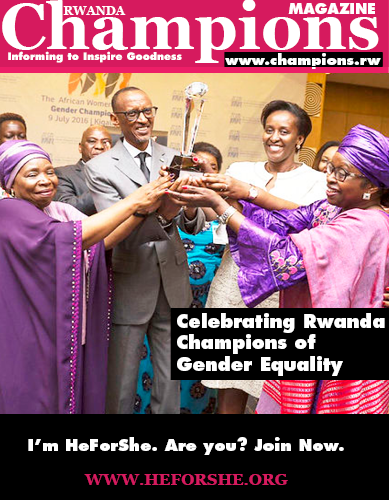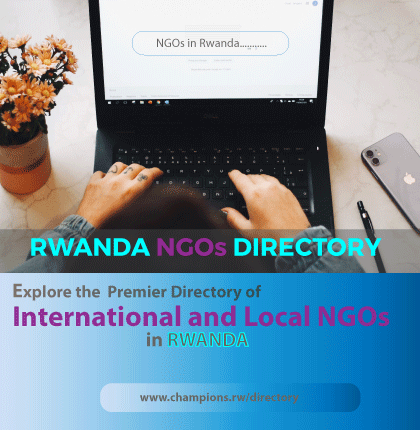Paloma Lengema Leads BIC East Africa Through Growth, Innovation and Community Impact
They say actions speak louder than words. For Paloma Lengema, general manager of BIC East Africa, the company’s (…)

By Andre Gitembagara, RNMU President.
Nursing is a profession that seems to draw people with compassion and a desire to help others. Throughout history, nurses have been on the front lines of military conflicts, and have provided their caring expertise in hospitals and clinics around the world. If you decide to go into nursing, you will be in good company.
Rwanda Nursing and Midwives Union (RNMU) is a registered Union, non -governmental organization, non- political, non-religious, and non -profit organization. The Union holds a vision of having an empowered nurse and midwife who is motivated to provide high quality service and uphold professional excellence while enjoying quality life. Being a member of the Union is voluntary and benefits of membership are equal.
One of the Union’s objectives is to promote gender equality in its leadership structure and functioning. The policy of the leadership appointment and election states that both females and males should contest for the available positions equally at 50%. This is aimed at ensuring that female nurses are empowered to participate in the leadership of the Union.
RNMU Leadership Structure
The structure of RNMU encourages the female nurses to contest for all positions and this is achieved through elections. The Union is headed by the President and if a male is voted in this position, the second position is left for females to occupy. In the RNMU structure, there is also a position of “commissioner in charge of gender and social welfare.” This person is in charge of maintaining the gender balance in the organization and influencing the social well-being of the nurse. RNMU ensures gender balance to empower its members regardless of their sex.
The RNMU Women Social Group
Besides its functional structure, RNMU has a social group of women attached to it. The Union supports the female nurses in terms of finance and other necessities for them to be able to discuss and solve the problems they meet in their daily professional and personal life.
Usually, nurses console patients going through a difficult diagnosis, keep the ones in critical conditions comfortable, and save lives of many others in a short period of time. Yet nurses do all of these life-saving tasks masterfully without fail yet majority of them do not care for themselves or their wellbeing. The social group therefore gives them an opportunity to discuss strategies that promote their professionalism and ensure their healthy living such conducting walking meetings, and stretching to increase blood flow to the muscles. They also get opportunity to laugh, play and relax for just five to ten minutes which prompts better immunity and overall health and well-being. They also meditate, rest and sleep. Stilling the mind and relaxing the body helps with decision-making, clarity of thinking and response to stressful stimuli. With this, the nurses provide quality services and the patients eventually receive satisfying care.
Leadership training
Nurses constitute the backbone of the healthcare system in developing countries (Wirth, 2008). Rwanda, as a developing country, is not exceptional to this fact. Continuous professional development has proven to be a critical tool to enhance practicing nurses’ competencies, hence improving patient outcomes.
One area for which nurses need continuously updated knowledge is leadership. It is crucial for practicing nurses to develop and maintain leadership competencies for enhanced quality patient care. In this regard, the Union conducted a rapid needs’ assessment survey to investigate nurses’ gaps in competencies pertaining to leadership.
The survey, conducted in March 2015, revealed numerous gaps that nurses possessed in various leadership areas including human and women rights, organizational and organizing skills, public speaking, entrepreneurship, ICT, advocacy, negotiation, and conflict management. The discovery of these gaps initiated the desire of the Union to empower nurses, especially young women, providing them with the needed knowledge and skills to become effective leaders.
Among the course units given to the nurse are nursing Informatics, Conflict Management, negotiation, Professional and personal organizing skills, entrepreneurship in nursing and midwifery profession, human and women rights, advocacy and Public Speaking.
Mama Nathalie training
Mama Natalie is a birthing simulator that makes it easy to create very compelling simulations of complex or normal birthing scenarios. It is strapped onto the operator, who takes the role of the mother, and manually controls the training scenario and features such as Bleeding, Positioning and delivery of the baby, Delivery of placenta, Fetal heart sounds, Cervix landmark, Urine bladder catheterization, Uterine massage and Uterine compression.
The Union as a continuous professional development provider in collaboration with the Norwegian Nurses Organization (NNO) provides continuous professional development training for nurses/midwives who work in Gyneco-obstetrics in order to build their capacity in labor management for better life of mothers and babies. When midwives undergo such quality trainings, it does not only benefit them but also the mothers giving birth.
They say actions speak louder than words. For Paloma Lengema, general manager of BIC East Africa, the company’s (…)
The Rwanda Meteorology Agency (Meteo Rwanda) has announced that the country is expected to experience (…)
Rwanda’s inflation eased slightly in October 2025, driven largely by rising food and energy costs, according to the (…)
Minister of Trade and Industry, Prudence Sebahizi, said Friday that a small increase in diesel prices will not lead (…)

